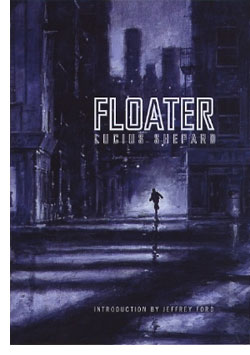 |
 |

Lucius Shepard
Floater
PS Publishing
UK First Edition Hardcover/Trade Paperback
ISBN 1-902-88080-3 / 1-902-88079-X
Publication Date:10-15-2003
154 Pages; $40.00 / $16.00
Date Reviewed: 12-04-2003
Reviewed by: Rick Kleffel © 2003
Index:
Mystery
Horror
Genre fiction can become either a tool or a trap. Readers are all too familiar with the latter. The shelves of bookstores are jam-packed with fiction written to fit a formula. The whole never exceeds the sum of the parts in the formulae utilized by cookie-cutter fiction. But in the hands of a talented writer, the tropes of a genre, from science fiction to mystery to romance to horror, can be liberating. Genre fiction offers writers a chance to reach outside of reality, outside of their own experience, and connect with readers on an intensely imagined fictional plane shared by reader and writer. There, the bond between storyteller and audience is forged on a visceral level of mutual literary heritage. Readers know what to expect — and good writers know how to maneuver around those expectations to delight the reader and create higher expectations for their next reading experience.
Horror fiction is particularly useful in externalizing a character's emotional landscape. Lucius Shepard's 'Floater', a short novel from PS Publishing, offers a beautifully wrought, terrifying vision of post 9/11 New York filtered through the tortured conscience of an NYPD detective involved in the tragic shooting of an unarmed Haitian immigrant. Shepard sets the scene and gets the grit, plunging the reader into the perspective of Detective William Dempsey. Hooked on a vicious mix of alcohol, pills and self-pity, Dempsey is going down for the third time. His fiancée has left him, he's been on leave for months with no sign of improvement, and the problem with his vision is getting worse, not better. There's a floater in his eye, a microscopic scrap of protein that casts a shadow over everything he sees.
Shepard's prose is the perfect mix of grimy city slang and emotive understatement. Dempsey's understandably a troubled man. On one hand, he must stand with those who were by his side or be cast out from the fraternity that has defined his life thus far. On the other hand, the shooting was clearly wrong — or was it? Could the victim have been a "wrong guy"? Shepard's writing is evocative but never too precious. It's also quite gripping. No matter how warm and safe you are, you'll feel as if you're on the streets of New York with the wind slicing through your jacket, one foot in front of the other in the sludge and slush of filthy snow on the sidewalks. The tension is palpable from the first page. There's clearly more to this shooting than Dempsey knows. In order to salve his anguish, and salvage his reputation and career, Dempsey must find out why the shooting happened. But in doing so, he will discover a whole new world of hurt.
Dempsey's investigations lead him from warehouse raves to storefront temples, Santeria ceremonies — and back to his little vision problem. This is a novel about why we see the way we see, played out through a slide into a realm of surreal supernatural revenge. Shepard's New York landscape is one of aching absence. Emotions, excuses, exceptions — nothing can stop the descent into reality as we do not ever wish to know it. Yet Shepard's tense plot and powerful prose can hardly be read fast enough. His words are a leash that will pull the reader to the final paragraph on the final page.
PS Publishing's package and presentation is no small part of the success of this taut novel. At 154 pages, it's too long for inclusion in an anthology, even one of novellas. But it's too short for the average American paperback or hardcover release. This is not to say that it's undeserving of such support. This is world-class writing. But PS Publishing has made its name in the novella and short novel format, and this lives up to their highest standard. It also benefits from British Fantasy Award winner Edward Miller's cover art, while World Fantasy Award winner Jeffrey Ford's introduction is spoiler-free and insightful.
'Floater' is an exceptionally good novel by a writer clearly at the top of his game. It uses the tools of two genres — police procedurals and the supernatural horror — to dive deep into a mind tormented by deserved guilt, and to evoke physical, psychological and cultural landscapes. In synthesizing the three, Shepard creates his own vision, derivative of none, as powerful as any. Readers won't find this landscape comforting, but it's certainly compelling. Shepard evokes the unease of a New York changed, cold, and unknowable. Read 'Floater'. You'll see.
|
 |
|
|
 |
| |
Review Archive
All Reviews alphabetized by author.
General Fiction
Non-Genre, general fiction and literature.
Horror
Supernatural fiction, supernatural horror and non-supernatural horror.
Science Fiction
Science fiction, science fantasy, speculative fiction, alternate history.
Fantasy
Fantasy, surrealism and magic realism.
Mystery
Crime, thrillers, mystery, suspense.
Non-Fiction
Non-Fiction, True Crime, Forteana, Reference.
Poetry
|
|
 |
|




